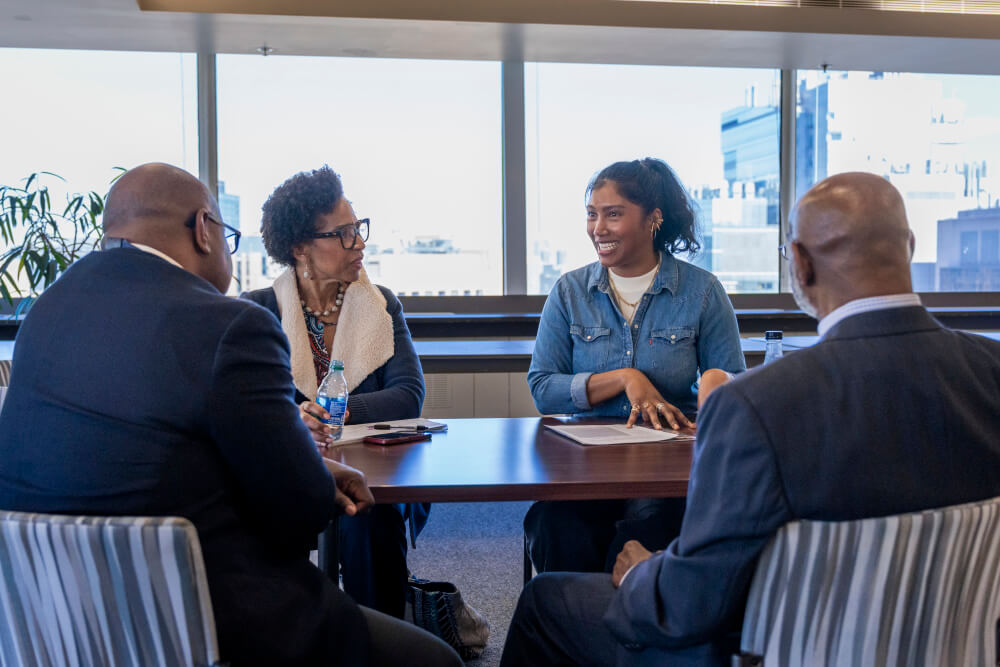Simone Ledward-Boseman has many roles: She’s a writer, artist, and singer. And for some time, she was a caregiver to her late husband, Chadwick Boseman, the actor known for playing Black Panther and groundbreaking figures like James Brown and Jackie Robinson. These days, Ledward-Boseman has added more titles to her list: activist and advocate.
“I’m an advocate because I’m angry,” she recently told a crowd gathered at Dana-Farber’s Young-Onset Colorectal Cancer Center’s Fifth Annual Patient and Family Forum. Given his age, doctors did not believe that Boseman was at risk for cancer. “We had no idea to check for it,” Ledward-Boseman said. In 2016, Boseman was diagnosed with colon cancer, and Ledward-Boseman was left wondering if they had wasted time.
The story was familiar to many in the room that day who had experienced a diagnosis at a young age. And as Ledward-Boseman pointed out that afternoon, it’s an experience that is becoming more common as higher rates of young adults are facing colorectal cancer. Chadwick may have died almost four years ago, but Ledward-Boseman is on a mission to honor her experience by raising awareness, connecting with survivors and caregivers and promoting the importance of screening.

You are not alone
When her husband was diagnosed, Ledward-Boseman was “overwhelmed by the barrage of emotions” that followed. At 26, it was her first exposure to the hospital system and a serious health concern. The amount of information almost intimidated her into paralysis. She felt lost, isolated, and afraid.
“It was like being sucker punched in both eyes and then being told to drive a semi through an obstacle course at the edge of a cliff,” she said. “Impossible.” The challenge was heightened for Ledward-Boseman and her husband as they continued to lead public lives and work in media.
These feelings propelled her to the podium. She wants survivors and their caregivers to know that they are not alone. There is no training to prepare you for a cancer diagnosis, but day after day, people step up to the challenge — just as Ledward-Boseman did.
“No way was I going to leave him to fight this thing on his own,” she told the audience, holding back tears. “We do our best. I see you. I’m really proud of you.”
Simone’s advice
Over the years of caring for and supporting her husband, Ledward-Boseman learned valuable lessons, including the importance of giving yourself pause. Caregiving is a huge challenge, and there is a fine line between providing care and allowing autonomy and dignity and anticipating problems but not being too worrisome.
“We’re no good to anyone if we’re exhausted,” she advises caregivers. “Take the time,” even just a moment to pause and step away, whether it’s on a balcony, in the car, or out for a walk.
There was pressure to appear outwardly strong while her interior world crumbled, but you “can’t suffocate your emotions,” she advised. “You can be afraid and still have faith.” Practice radical honesty, Ledward-Boseman told the caregivers gathered. Whenever you can, try to describe how you feel. Employ the people who want to help. Give them small tasks like cooking or cleaning. Accepting help isn’t a sign of weakness, and it will benefit you and your support network.
There may come a time when you’ll feel a calling to become an advocate, Ledward-Boseman said. You have this knowledge now: Carry it into your community, she added. Tell everyone who will listen to get their colonoscopies. It’s not easy, cancer is a heavy topic, and people don’t want to hear about it, but it’s vital work.
